This report outlines the established purpose and availability of fee waivers for immigration applications, examines recent USCIS proposals to limit access and create more stringent evidentiary standards, and explores the potential consequences of a more restrictive framework on domestic violence victims and other survivors of crime. It includes results of an informal survey of legal service providers assisting domestic violence and other crime victims from around the country. Finally, it offers recommendations to make fee waivers accessible and facilitate broad access to humanitarian immigration benefits.
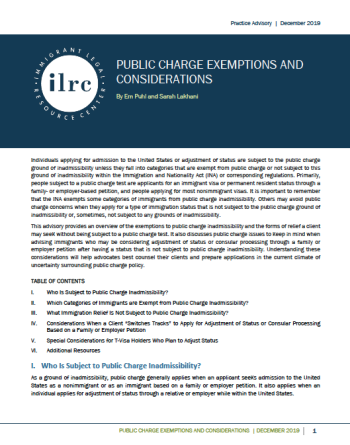
It is important to remember that immigration law and regulations exempt some categories of immigrants from public charge inadmissibility and provide many types of immigration status that are not subject to the public charge ground of inadmissibility. This advisory provides an overview of the exemptions to public charge inadmissibility and the forms of relief a client may seek without being subject to a public charge test. It also discusses public charge issues to keep in mind when advising immigrants who may be considering adjustment of status or consular processing through a family or employer petition after having a status that is not subject to public charge inadmissibility. Understanding these considerations will help advocates best counsel their clients and prepare applications in the current climate of uncertainty surrounding public charge policy.
Preparing a strong case for bond for detained clients has become more important than ever. This practice advisory discusses how to address evidentiary issues and challenges in bond proceedings and provides tips for proving your bond case, as well as overcoming negative factors.
In order to qualify for naturalization, lawful permanent residents must meet several residence and physical presence requirements that are often mistaken for one another and muddled together. Traveling outside of the United States can not only affect these requirements for naturalization, but they can cause United States Citizenship and Immigration (USCIS) officials to find that a person abandoned their lawful permanent resident status, which can have severe consequences. In this practice advisory, we review these requirements in detail as well as the related issues surrounding abandonment of lawful permanent residence.

People who were wrongfully admitted to the United States due to a misrepresentation—i.e., those who were in fact inadmissible at time of admission—may be eligible for a waiver of deportability under INA § 237(a)(1)(H). This lesser-known waiver is only available in removal proceedings and unlike most waiver requests, does not involve any application form or fee. This advisory explains who can request a 237(a)(1)(H) waiver and the process for applying.
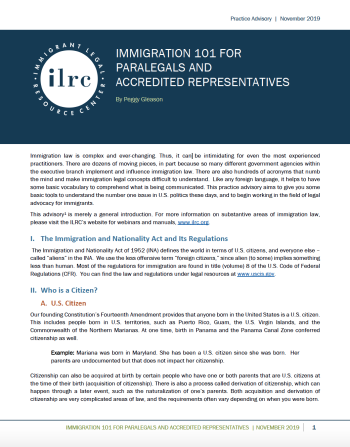
This advisory provides an overview of basic concepts in immigration law and describes the government agencies that work in this area. It is a primer for paralegals and accredited representatives who are new to the subject.
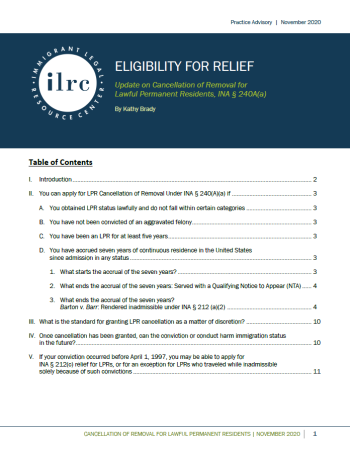
Cancellation of removal under INA § 240A(a) is an important defense for lawful permanent residents who have become removable, due to criminal record or other reasons. The requirements for statutory eligibility are complex, and it is critical for advocates to understand the risks and strategies that arise from the Supreme Court’s decision on the “stop-time” rule, Barton v. Barr, --U.S.--, 140 S.Ct. 1442 (2020). This Advisory is an updated step-by-step guide to eligibility, potential arguments, and defense strategies for LPR cancellation.
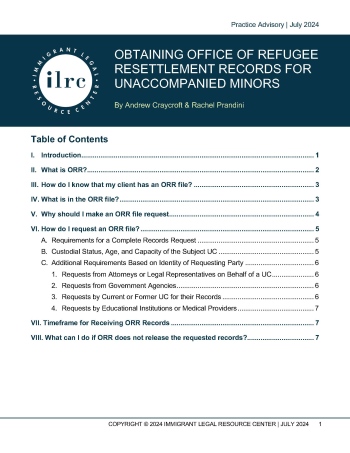
Office of Refugee Resettlement (ORR) records requests are an important tool for advocates who are representing people who were detained in ORR custody as children. This practice advisory discusses the role ORR records play in an immigration case and outlines the process for requesting them.
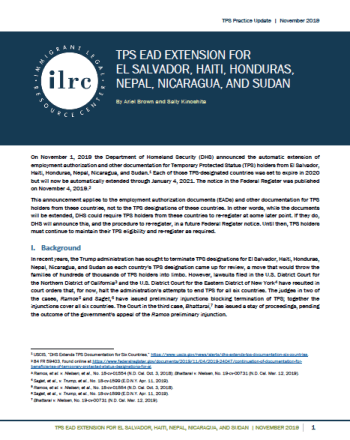
On November 1, 2019 the Department of Homeland Security (DHS) announced the automatic extension of employment authorization and other documentation for Temporary Protected Status (TPS) holders from El Salvador, Haiti, Honduras, Nepal, Nicaragua, and Sudan. Each of those TPS-designated countries was set to expire in 2020 but will now be automatically extended through January 4, 2021. This practice advisory lays out what community members need to know and should do now.
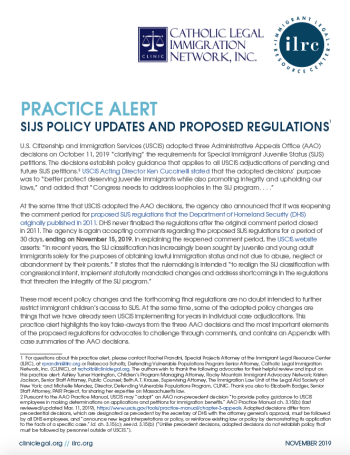
This practice alert highlights the key take-aways from three recently adopted AAO decisions and some of the most important elements of the proposed regulations for advocates to challenge through comments, and contains an Appendix with case summaries of the AAO decisions.